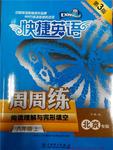
---You look so tired!
---Yesterday I waited for my mum she came back at 12 o’clock.
| A.before | B.after | C.until | D.when |
 快捷英语周周练系列答案
快捷英语周周练系列答案科目:初中英语 来源:新疆自治区同步题 题型:完形填空
| 完型填空。 | |||
| Mr. s Green lives in the country (乡村), and she doesn't know London very well. One day, she goes to London. She can't find her __1__. Just then she __2__ a man near a bus stop. "I can ask him the way," she says to __3__ and asks," Excuse me, will you please __4__ me the way to King Street?" The man smiles with __5__ answer. He __6__ know English. He speaks Russian. He is a visitor. Then he __7__ his hand into his pocket (口袋), __8__ a piece of paper and lets her __9__ it. On the paper are these words, "Sorry, I __10__ English. | |||
|
查看答案和解析>>
科目:初中英语 来源: 题型:阅读理解
WC, toilet, lavatory, bathroom, restroom, john --- English has many ___31___ for the little room we all have to go to every day. Here are some of the words that ___32___ and explanations of their meanings.
Different countries use different words. In the US, in ___33___ home, you will get ___34___ you need to go if you ask where the “bathroom” is. If you are in a shopping mall, you ___35___ ask directions to the “restroom”. US people also use the word “john”, which is named ___36___ the 19th century British inventor of the flush toilet (although he seems to have been called Thomas.).
In Britain the most commonly used words are “toilet” and “bathroom”. But “WC”, which ___37___ for “water closet”, and “lavatory” are also used. A public toilet is a “public convenience”. People ___38___ speak of the “ladies” and “Gents” (you see the words “Ladies” and “Gentlemen” above the ___39___ to public toilets). An older, now rarely used word in Britain is “privy” which is short for “ ___40___ ”.
Australians say “loo” , which is quite popular in the UK ___41___. Canadians use the word “can ”, New Zealanders “bog”, ___42___ South Africans “want to go to the bathroom”.
Where does the word toilet itself ___43___ from? Well, it’s from the French “toilette” ---- to wash ___44___.
People from ___45___ countries also use some humorous words. For example, “ throne” to describe the toilet and “throne room” foe the bathroom.
31. A. words B. names C. places D. titles
32. A. uses B. use C. is used D. are used
33. A. some B. anyone C. someone’s D. somebody
34. A. how B. what C. where D. when
35. A. would B. must C. should D. can
36. A. in B. for C. after D. at
37. A. stands B. writes C. says D. asks
38. A. sometime B. never C. sometimes D. some times
39. A. entries B. exits C. roofs D. walls
40. A. pretty B. private C. plenty D. practice
41. A. what B. which C. who D. whose
42. A. as well B. also C. too D. either
43. A. is B. comes C. come D. change
44. A. me B. yourself C. us D. you
45. A. developing B. developed C. poor D. English-speaking
查看答案和解析>>
湖北省互联网违法和不良信息举报平台 | 网上有害信息举报专区 | 电信诈骗举报专区 | 涉历史虚无主义有害信息举报专区 | 涉企侵权举报专区
违法和不良信息举报电话:027-86699610 举报邮箱:58377363@163.com